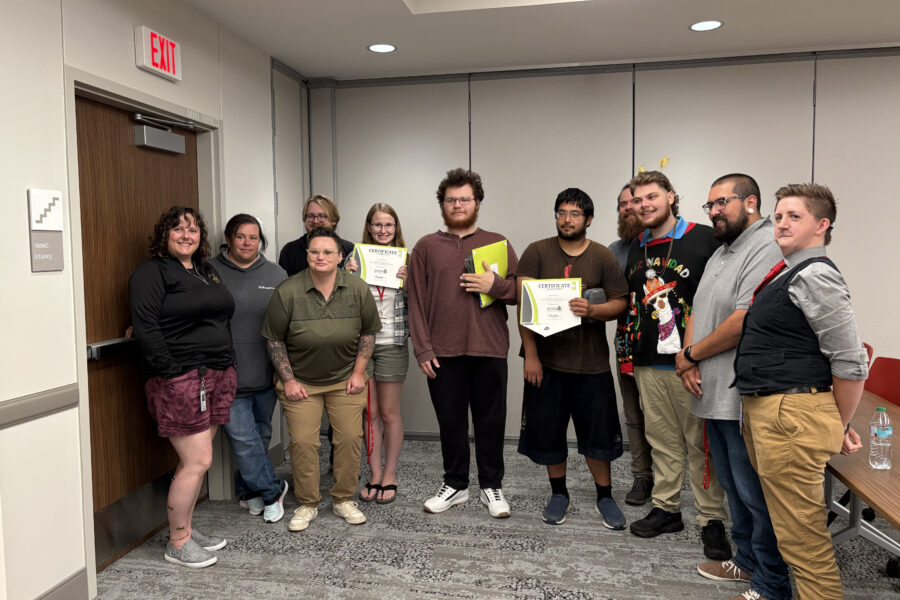Jose Arriola enjoys tinkering and learning how things work.
Now he can put those interests to the test thanks to his new mobile device repair certification.
Arriola was one of four students to earn the achievement through a collaboration with the Munroe-Meyer Institute, Metropolitan Community College and an iFixAmerica training program administered by professionals from iFixOmaha, a local mobile device repair business.
The program was funded through a grant from the U.S. Department of Education.
The collaboration between MMI and MCC has long been in the works, said Rachel Ray, director of the MMI-UNO Trailblazer Program.
“It was the right place and the right time to where everybody felt confident that our students would be successful,” Ray said.
The class did, indeed, find success. All four students — Arriola, Emmy Miller, Adyson Sandoval and Drew Curphey — passed with flying colors and received their Wireless Industry Service and Excellence certifications during a graduation ceremony held at MMI in late July.
MCC offers a Mobile Device Repair Academy through its Credential College, which works with high school seniors who self-identify they do not plan to pursue a college degree after graduation, said Todd Hansen, associate vice president of community and workforce education at MCC.
MCC’s Mobile Device Repair Academy, is the first of its kind in postsecondary education. It’s done through partnerships with the Cellular Telecommunications and Internet Association and iFixOmaha.
The academy offers two certifications and an internship program. iFixOmaha has three locations, including one on MCC’s Fort Omaha Campus.
“At MCC, we’re in communities to educate all learners, from 5 to 85 and older,” Hansen said. “This project fits right in with that and with MMI’s goal to find opportunities for all abilities. We’re here for everybody.”
After the success of the first cohort, Hansen said they’re dropping the word “pilot” from the project. The plan is to continue the program with support from both MCC, MMI and other partners.
MMI did assessments to determine what students might be good fits for the program, Ray said. They also worked with Nebraska Vocational Rehabilitation to recruit their clients.
From there, instructors with iFixOmaha modified coursework to make it accessible, but the standard remained high.
“Every participant passed with flying colors,” said Jason DeWater, iFixAmerica and iFixOmaha founder. “They’re more than confident. They’re masters.”
DeWater wrote the first assessment for the cohort. He wanted it to be tough as nails.
Before class, he scored an 87 on the assessment.
“I’m sweating and nervous as they’re taking the assessment,” he said.
He observed from the back of the classroom, watching students slowly close their laptops and leave. But Emmy Miller sat there, all questions answered, mouse hovering over the big green “submit” button.
DeWater urged her to click the button. She did and she netted a perfect score.
The group asked good questions, worked hard and experienced productive trial-and-error.
“They were all rockstars. All four of them,” he said.
Addressing the graduates at the commencement, DeWater choked back tears. “Your potential is going to change the industry. Drew, Adyson, Emmy and Jose, I’m so proud of you.”
Ray echoed those sentiments, saying how much employment can change lives.
“I am so proud of our students,” Ray said. “We always look for the high wage, high demand, high skill jobs. We did it. This sets everybody up for success.”
For Arriola, graduating with a certificate felt like an accomplishment.
“It’s a nice feeling knowing I can help someone fix something that’s broken,” Arriola said.
Next, he hopes to find a job in a repair shop while continuing to improve his skills.
“It’s going to be a job that I like,” he said.
He offered advice for his peers considering similar programming: “This is a privilege. Don’t be afraid to try new things. Be open-minded and look for opportunities to advance.”
The contents of this report were developed under grant H421F240047 from the U.S. Department of Education. The department does not mandate or prescribe practices, models, or other activities described or discussed in this document. The contents of this story may contain examples of, adaptations of, and links to resources created and maintained by another public or private organization. The department does not control or guarantee the accuracy, relevance, timeliness, or completeness of this outside information. The content of this story does not necessarily represent the policy of the department. This publication is not intended to represent the views or policy of or be an endorsement of any views expressed or materials provided by any federal agency
